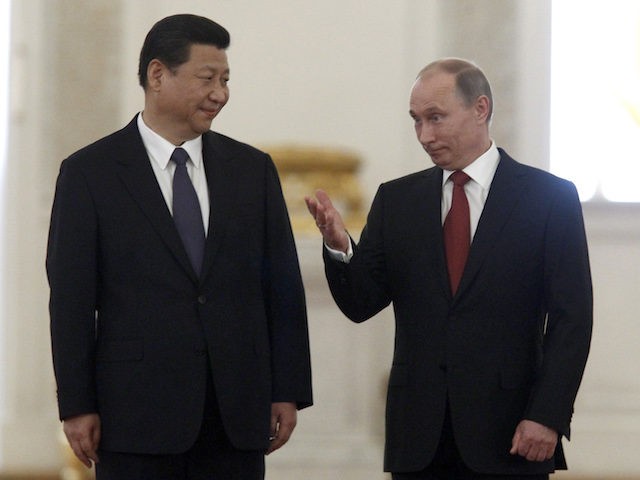In an interview broadcast on Wednesday before departing for China, Russian President Vladimir Putin reflected on his close relationship with Chinese President Xi Jinping by recalling Xi as the only world leader who celebrated Putin’s 61st birthday in 2013.
“I won’t hide it, we had a shot of vodka and sliced some sausage,” Putin told China’s CCTV. “We finished the day’s work and he celebrated my birthday with me. This might seem irrelevant, but to talk about President Xi, this is where I would like to start.”
“I’ve never established such relations or made such arrangements with any other foreign colleague, but I did it with President Xi,” Putin added.
This was an odd statement for two reasons. First of all, it is 2018, and it is no longer necessary for two men to hide the fact that they had a few drinks and then sliced sausage together.
More importantly, the South China Morning Post points out that Putin is wrong: Other Asian leaders gathered at the Asia-Pacific summit in Bali, Indonesia, in 2013 did celebrate his birthday. Former Indonesian President Susilo Bambang Yudhoyono played guitar while they sang “Happy Birthday” to the Russian leader.
There is a video of the event on YouTube:
Putin and Xi do seem to have developed an unusually close relationship. The South China Morning Post reports they have met more than 20 times, and Xi has visited no foreign capital more often than Moscow. When he last visited in July, Putin bestowed Xi with Russia’s highest state honor, the Order of St. Andrew.
Last July, the Economist found relations between Russia and China running a bit behind the close friendship between Putin and Xi, but there are good reasons for the two countries to grow closer, including their mutual desire to balance the military, economic, and diplomatic power of the United States, and their shared interest in promoting autocracy as an ideological challenge to American free-market democracy.
Stumbling blocks in the alliance between Russia and China include China’s far greater dependence on trade with the United States, China’s diminishing reliance on Russian arms manufacturers, Chinese distaste for the flagrant corruption of the Russian system, and China’s unease with the example of Crimea – a breakaway province whose story hits a little too close to home for Chinese leaders worried about Taiwan and Tibet.
Analysts wonder if Putin will have trouble adjusting to his role as the junior partner in an alliance with increasingly powerful China led by dictator-for-life Xi.
“Sino-Russian relations are very pragmatic. But in the end China will be increasingly dominant,” Kerry Brown of the Lau China Institute at King’s College in London told the South China Morning Post in March.
“Longer term China is the only power with the real ability to truly contest US dominance, and It is already doing so. For China, Russia is a convenient power. For Russia, China is a necessary one. That’s the difference,” said Brown.

COMMENTS
Please let us know if you're having issues with commenting.